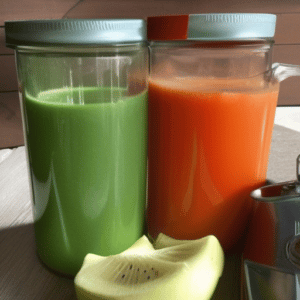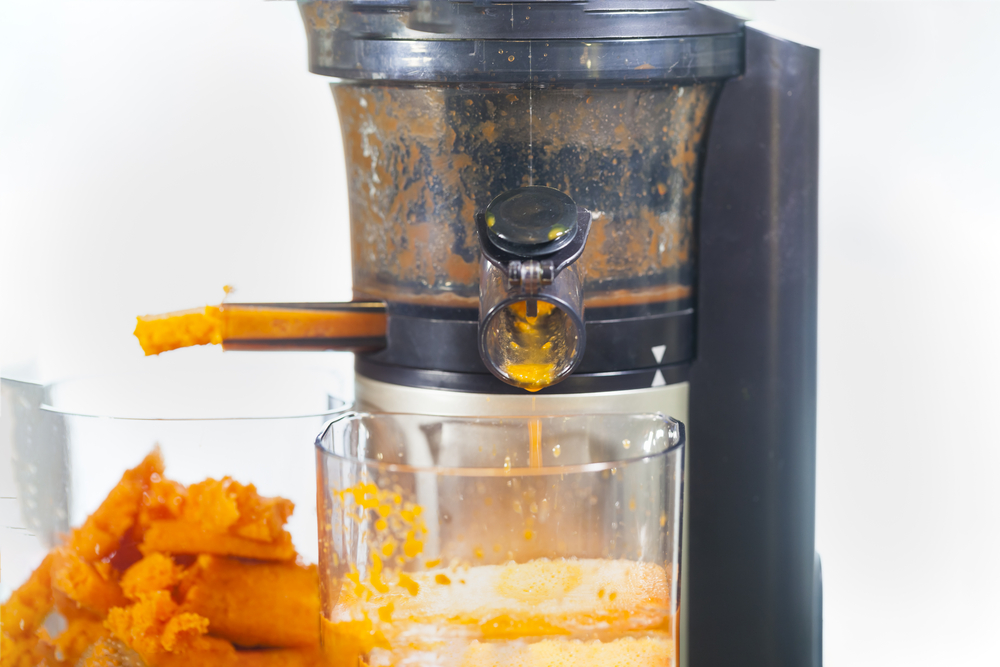Juicing is the process of extracting juice from fruits and vegetables. This can be done by using a juicing machine or juicer.
Centrifugal, masticating, and triturating juicers are the three major varieties available for household use.
Although the focus of this article will be masticating juicers, we will still provide some information on the other kinds of machines so you can choose the one that would work best for you. So, what is a masticating juicer? Read on to find out!
Masticating Juicers Explained
What is a masticating juicer, then? “Masticating” is another word for chewing. Thus, a masticating juicer – also called a slow juicer or single auger – mimics the way we chew to extract juice from various fruits and vegetables.
Despite having several benefits, masticating juicers are not the most popular juicer for home use – and we’ll explain why this is in a minute.
First, let’s take a look at how masticating juicers work.
A single gear, known as an auger (a tool resembling a corkscrew), slowly bores down into the fruits or vegetables that you drop into the machine. As the auger rotates, it slowly works to separate the juice from the pulp.
The juice gets pushed through a layer of mesh into the container below, thereby leaving the pulp behind. The juice then drains out of a nozzle into a glass or jug placed beneath it as it comes out of the machine, ready for consumption.
Of course, this means that the process of extracting the juice can take quite a long time with one of these machines (it is called a slow juicer for nothing!). This may come across as a potential drawback of these machines and is the reason why some people may be put off buying one.
However, as we will explain in the next section, juicing fruits and vegetables at a low speed is actually better for preserving the nutrients in the juice, producing a higher juice yield, and prolonging the lifespan of your machine.
The Benefits of Masticating Juicers

Firstly, the fact that slow juicers take a long time to extract the juice from fruits and vegetables means that they are more effective at removing the good stuff (the enzymes, vitamins, and minerals) from the plant fibres. It also results in a higher juice yield, making masticating juicers more economical than other types of juicers.
Secondly, slow masticating juicers produce less heat as a result of their reduced speed, which helps to slow down the oxidation process. “Oxidation” is just a fancy word for the way oxygen causes certain materials to corrode. It is also the reason why food starts to go sour and turn brown.
Fruits and vegetables are particularly susceptible to oxidation during the juicing process, so a slow masticating juicer is your best option if you want a juicer that won’t affect the quality of the juice you extract.
Moreover, reducing the amount of oxidation that takes place during the juicing process also prolongs the shelf life of the juice.
To put this into perspective, the juice produced by centrifugal juicers starts to deteriorate within a few hours after juicing. The juice produced by masticating juicers, on the other hand, can stay fresh for up to three days, provided that it is properly stored in the fridge.
Another great thing about slow juicers is that they are typically more durable than other types of juicers. This is due to their slow speed, which puts less strain on the motor. This is beneficial because these juicers are typically more expensive than other juicers, meaning that you’ll get your money’s worth out of the machine before having to replace it.
Tips for Using a Masticating Juicer
Although masticating juicers can reduce even the hardest vegetables to a pulp (pun intended), you will achieve better results by taking the time to roughly chop up your ingredients before feeding them into the chute. Not only will this help the process to run more smoothly, but it will also reduce the amount of time it takes the machine to do its job – albeit not by that much.
Due to the fact that the extraction process takes quite a long time with these juicers, we recommend that you juice in bulk. In other words, pick a time during the week to do enough juicing to last you for a couple of days – just don’t go overboard by making more juice than you can drink before it starts to go bad.
In conclusion, we recommend masticating juicers to the more discerning juice enthusiasts out there. If juice quality and yield are important to you, then buying one of these juicers is definitely the way to go.
Here is a quick recap of their pros and cons:
Pros:
- Maximises juice yield
- Produces nutrient-rich juice
- Minimises oxidation
- Juices almost all types of ingredients (including hard and soft fruits and vegetables, leafy greens, etc.)
- Durable
- Quiet
Cons:
- Slow juicing process
- Expensive
- Difficult to clean
Other Types of Juicers
Centrifugal Juicers
These are the most common type of juicers on the market. They are convenient and easy to clean, making them a popular choice for people who want to try juicing for the first time.
Centrifugal juicers are sometimes referred to as “speed juicers” because they take very little time to extract the juice from fruits and vegetables.
This is thanks to a metal blade that spins against a mesh filter at high speed, chopping up the ingredients that you add to the machine. The juice and the pulp are separated via centrifugal force (hence the name) and are then split into two different containers.
Unfortunately, operating at high speed also generates a lot of heat. This means that centrifugal juicers are not very good at preserving the enzymes and nutrients that were present in whole fruits and vegetables before the juicing process began. The heat also contributes to oxidation, which negatively affects the quality of the juice.
So, if you’re willing to compromise on juice quality to save yourself a bit of money, then a centrifugal juicer may be the best juicer for you.
Pros:
- Fast/saves you time
- Affordable
- Easy to clean
- No additional preparation is needed beforehand
Cons:
- Produces a lot of heat
- Results in a less nutritious juice
- Contributes to oxidation
- Noisy
Triturating Juicers

A triturating juicer, also known as a twin-gear juicer, generally falls into the top-of-the-range category. Plus, it is therefore not recommended for people who occasionally want a glass of fresh juice (unless you’re fortunate enough to have the budget for it, as these machines typically come with a hefty price tag).
As well as being fairly expensive, twin-gear machines are also a bit of a hassle to clean. That being said, some twin-gear juicers have been designed to be more user-friendly. It’s also possible to find a good quality machine that won’t cost you an arm and a leg.
Let’s look at some of the other features that set twin-gear juicers apart from the previous two types of juicers.
Twin-Gear Juicers vs Masticating Juicers:
Twin-gear juicers are not fitted with an auger like most masticating juicers. Instead, they apply extreme pressure to extract the juice from the fresh produce you drop into the machine, making them more similar to cold-press juicers (see below).
However, the difference between a twin-gear and a cold-press juicer comes with their mechanisms for crushing the fresh ingredients. The former has two metal gears placed very near one another; the latter uses a hydraulic press.
The fruits, vegetables, or leafy greens that you drop into the chute are forced through the narrow opening between the two gears, crushing, cutting, and squeezing the produce all at once. It results in a high juice yield and the most nutrient-dense juice, which is indicated by the vibrant colour of the juice as it comes out of the machine.
Twin-Gear Juicers vs Centrifugal Juicers:
A twin-gear juicer operates at a much slower pace than a centrifugal juicer, resulting in less heat being generated by the machine.
As you’ve already learned, exposure to heat destroys some of the nutrients in freshly-pressed juice and also speeds up the rate of oxidation.
Thus, the juice that comes out of a twin-gear machine is usually of a much higher quality than the juice you get from a centrifugal juicer. This is because it hasn’t been exposed to a large amount of heat and retains more nutrients.
So, if you’re a regular home juicer who’s looking to maximise the number of health benefits you can get from pressing your own juice, then it may be worth your while to invest in one of these high-end juicers.
Pros:
- Produces the most nutritious juice compared to other types of juicers
- Maximises juice yield
- Minimises oxidation
Cons:
- Expensive
- Difficult to clean
- Slow juicing process
Cold-Press Juicers

These kinds of juicers are often confused with masticating juicers, but they are not the same thing. Their extraction processes are quite different. This is because a cold-press juicer is fitted with a hydraulic press instead of an auger.
Thus, the fruits, vegetables, of leafy greens that you put into the machine are first crushed and then pressed, resulting in a high juice yield with hardly any pulp.
We won’t go into any more detail about these juicers here because they are typically used for commercial purposes. Nonetheless, we thought it worthwhile to include them in this guide for the sake of clarity.
Do You Need a Masticating Juicer?
Aside from being able to make juice from scratch whenever you want it, there are several other reasons why you would want to buy your own juicer, including:
- Cutting down on food wastage – you can juice any overripe fruits and vegetables you have lying around before they go completely bad.
- Create unique combinations and recipes
- Saving money (especially by using produce that’s in season)
In addition, you can use juicing machines to make baby food that’s healthy and free from any unwanted additives.
We hope that our guide above has given you a better idea of the different types of juicers money can buy and that it will help you to choose the one that will work best for you.
Happy juicing!

